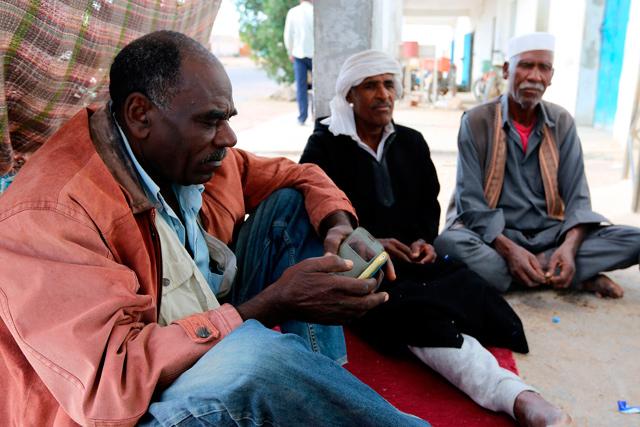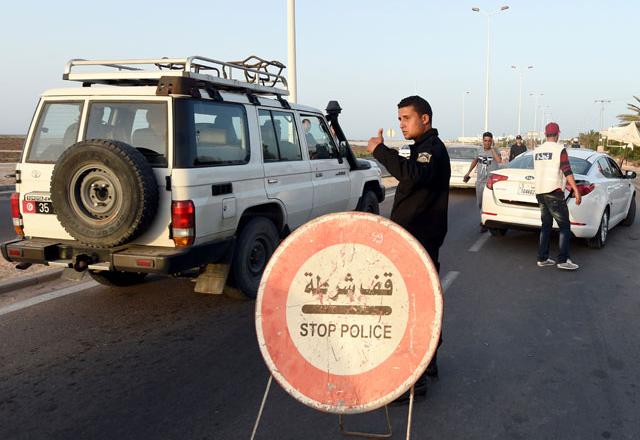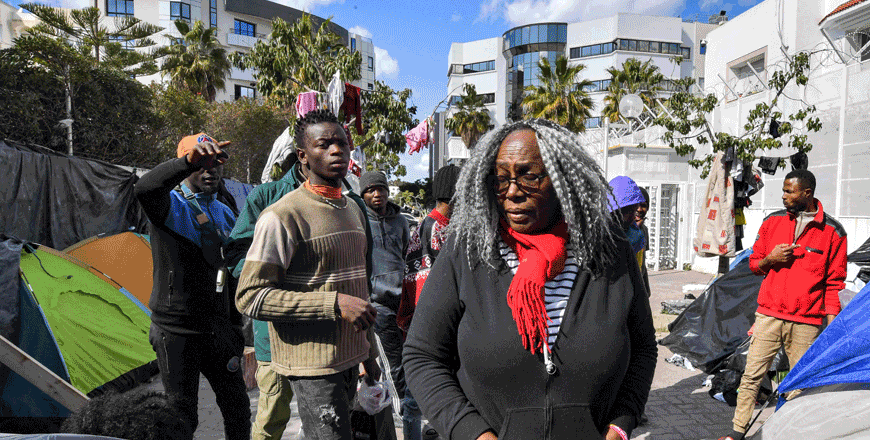You are here
Black Tunisians push for equality, in face of racism
By AFP - Nov 14,2018 - Last updated at Nov 14,2018

Tunisian men gather in Gosba, near the southeastern town of Medenine, on October 23 (AFP photo)
DJERBA, Tunisia — Tunisian Nadia Borji says she wants to be considered as equal but fears she will end up buried in her town's so-called "slaves" cemetery — because she is black.
Black Tunisians, including some descended from slaves, make up a minority that is barely visible in the north African country.
Many hope for greater equality after a law was passed last month criminalising all forms of racism.
"This term 'slave' disturbs me enormously. It shouldn't still exist!" protested Borji, who came to her mother's grave to read a prayer.
Black residents still bury their dead in a poorly maintained piece of land, full of earthen tombs covered with parched plants near Houmt Souk, on the island of Djerba.
Two other cemeteries lie a stone's throw away — reserved for people with light skin.
"We are accustomed to knowing that it is abnormal to suffer such discrimination," said 46-year-old Borji.
Her cousin Dorra Douiri directed her anger towards a "racist and very painful" societal schism.
"The worst thing is, it's a cemetery next to a mosque where the imams call for equality and respect," Douiri said.
The head of a municipal district in Houmt Souk acknowledged that cemeteries should not be separated.
"Cemeteries for slaves and cemeteries for free people — it is a phenomenon that exists and must be addressed," said Mourad Missaoui.
Unlike the major cities of Tunis and Sfax, Djerba residents bury their dead without requiring permission from the council.
This means their burial place can still be decided by social status and even their skin colour, he told AFP.
Historic law
Slavery was formally abolished in Tunis and in part of what forms modern day Tunisia in 1846.
On October 9, Tunisia's parliament adopted a landmark law penalising the use of racist words, the incitement of hatred and discrimination.
These crimes are now punishable by three years in prison and a 5,000 euro (5,600 dollar fine).
Racism remains "well anchored in the minds of many Tunisians", said Saadia Mosbah, president of M'nemty, an association that defends minorities.
Last month's law is an acknowledgement by the state that racism persists — but the law must now be applied, he added.
"The real work starts now," he said.
But there could be a long battle ahead.
"There is no harmony between legal texts and what happens in reality,” said municipal leader Missaoui.
Town halls on Djerba even use a designation widely perceived as being highly racist on slave descendants' birth certificates.
The word in question is "atig" — a prefix followed by the name of the master who granted freedom to the ancestors of the certificate holder.
In the absence of popular pressure to withdraw the designation — or a directive from the government — the word and "its racist connotations" will continue to be applied by town halls, said Missaoui.
Second class Tunisians
In the city of Medenine and the large village of Gosba, around 80 kilometres from Djerba, most people are black and many of them complain of racism.
"Our village is extremely marginalised, because of the colour of our skin," decried 27-year-old Mohamed, as he played cards on the floor of shop.
"We have no cafes, no cultural houses, no proper buildings — absolutely nothing," he complained. "There is only contempt".
"It is not this law that will protect the region. It requires above all investment... for residents, who are considered second class Tunisians," he said.
In Gosba, marriage between a black and white Tunisian is socially rejected.
"You can be the most handsome and rich man, (but) you'll always be black and they will never accept you marrying a white woman," said 61-year-old grocer Ali Koudi.
Related Articles
Hundreds of Jews were flocking to the Tunisian island of Djerba Wednesday for an annual pilgrimage to Africa's oldest synagogue with security tightened after the Bardo museum massacre and warnings of extremist attacks.
Tunisia said Sunday security measures have already been taken to protect Jewish pilgrims at a religious festival next week on the island of Djerba, after Israel warned of "concrete threats".
TUNIS — Like many black Tunisians, 26-year-old Nebras Magnnah has been fearful since waves of racist attacks targeting Sub-Saharan African m













